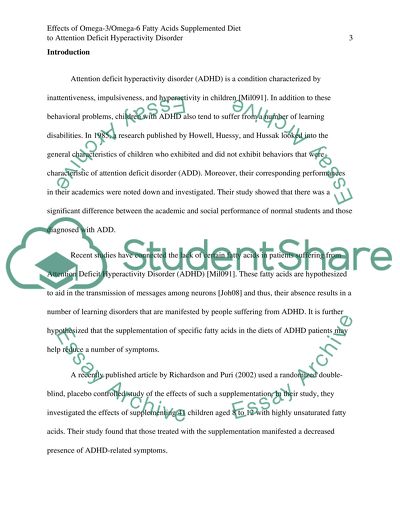Cite this document
(“Effects of Omega-3/Omega-6 fatty acids Supplemented Diet to Attention Research Paper”, n.d.)
Effects of Omega-3/Omega-6 fatty acids Supplemented Diet to Attention Research Paper. Retrieved from https://studentshare.org/health-sciences-medicine/1433712-effects-of-omega-3omega-6-fatty-acids-supplemented-diet-to-attention-deficit-hyperactivity-disorder
Effects of Omega-3/Omega-6 fatty acids Supplemented Diet to Attention Research Paper. Retrieved from https://studentshare.org/health-sciences-medicine/1433712-effects-of-omega-3omega-6-fatty-acids-supplemented-diet-to-attention-deficit-hyperactivity-disorder
(Effects of Omega-3/Omega-6 Fatty Acids Supplemented Diet to Attention Research Paper)
Effects of Omega-3/Omega-6 Fatty Acids Supplemented Diet to Attention Research Paper. https://studentshare.org/health-sciences-medicine/1433712-effects-of-omega-3omega-6-fatty-acids-supplemented-diet-to-attention-deficit-hyperactivity-disorder.
Effects of Omega-3/Omega-6 Fatty Acids Supplemented Diet to Attention Research Paper. https://studentshare.org/health-sciences-medicine/1433712-effects-of-omega-3omega-6-fatty-acids-supplemented-diet-to-attention-deficit-hyperactivity-disorder.
“Effects of Omega-3/Omega-6 Fatty Acids Supplemented Diet to Attention Research Paper”, n.d. https://studentshare.org/health-sciences-medicine/1433712-effects-of-omega-3omega-6-fatty-acids-supplemented-diet-to-attention-deficit-hyperactivity-disorder.


